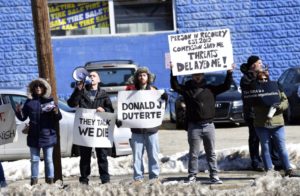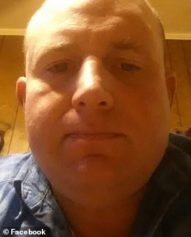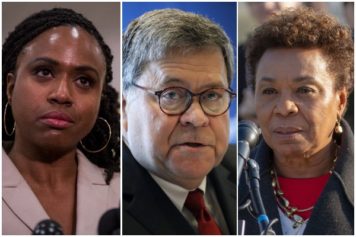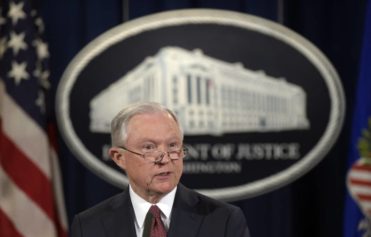
Protesters gather near the Manchester Central Fire Station in Manchester, N.H., Monday, March 19, 2018, where President Donald Trump madee an unscheduled visit. Trump is in New Hampshire to unveil more of his plan to combat the nation’s opioid crisis. (AP Photo/Susan Walsh)
MANCHESTER, N.H. (AP) — Unveiling a long-awaited plan to combat the national scourge of opioid drug addiction, President Donald Trump called Monday for stiffer penalties for drug traffickers, including embracing a tactic employed by some of the global strongmen he admires: the death penalty.
“Toughness is the thing that they most fear,” Trump said.
The president traveled to New Hampshire, a state ravaged by opioids and which is also an early marker for the re-election campaign he has already announced. The president called for broadening awareness about drug addiction while expanding access to proven treatment and recovery efforts, but the backbone of his plan is to toughen the punishment for those caught trafficking highly addictive drugs.
“This isn’t about nice anymore,” Trump said. “This is about winning a very, very tough problem and if we don’t get very tough on these dealers it’s not going to happen folks … I want to win this battle.”
The president formalized what he had long mused about publicly and privately: that if a person in the U.S. can get the death penalty or life in prison for shooting one person, a similar punishment should be given to a drug dealer who potentially kills thousands.
Trump has long spoken approvingly about countries like Singapore that have fewer issues with drug addiction because they harshly punish their dealers. During a trip to Asia last fall, he did not publicly rebuke Philippines President Rodrigo Duterte, who authorized extrajudicial killings of his nation’s drug dealers.
Outside a local firehouse that Trump visited before the speech, someone compared the leaders with a sign that said: “Donald J. Duterte.”
“Drug traffickers kill so many thousands of our citizens every year,” Trump said. “That’s why my Department of Justice will be seeking so many tougher penalties than we’ve ever had and we’ll be focusing on the penalties that I talked about previously for big pushers, the ones that are killing so many people, and that penalty is going to be the death penalty.”
He added: “Other countries don’t play games. … But the ultimate penalty has to be the death penalty.”
The Justice Department said the federal death penalty is available for limited drug-related offenses, including violations of the “drug kingpin” provisions in federal law.
It is not clear if the death penalty, even for traffickers whose product causes multiple deaths, would be constitutional. Doug Berman, a law professor at Ohio State University, predicted the issue would be litigated all the way to the U.S. Supreme Court.
John Blume, a professor and director of Cornell Law School’s death penalty program, said the Federal Drug Kingpin Act has yielded few “kingpins” or major dealers, mostly ensnaring mid- to low-level minorities involved in the drug trade.
Opioids, including prescription opioids, heroin and synthetic drugs such as fentanyl, killed more than 42,000 people in the U.S. in 2016, more than any other year on record, according to the Centers for Disease Control and Prevention.
Trump has declared that fighting the epidemic is a priority for the administration, but critics say the effort has fallen short.
Last October, the president declared the crisis a national public health emergency, short of the national state of emergency sought by a presidential commission he put together to study the issue.
Trump called for a nationwide public awareness campaign, which he announced in October, to scare kids away from dabbling in drugs. He announced a new website, www.crisisnextdoor.gov , where members of the public can share stories about the dangers of opioid addiction.
Trump said the administration will work to cut the number of opioid prescriptions that are filled by one-third within three years.
The president also discussed how his policies, including a U.S.-Mexico border wall and punishing “sanctuary” cities that refuse to comply with federal immigration authorities, would help reduce the flow of drugs and help end the addiction epidemic.
Monday was Trump’s first visit as president to New Hampshire, which has long occupied a special place in his political rise. He captured his first Republican presidential primary here in 2016, though he narrowly lost in the general election to Democrat Hillary Clinton.
Trump drew criticism last year after leaked transcripts of a telephone conversation with Mexican President Enrique Pena Nieto showed he had described New Hampshire as a “drug-infested den.” The Washington Post published the transcripts.
Though the 2020 election is more than 30 months away, early jockeying is already happening in states that play an outsized early role in choosing a party’s nominee. Retiring Sen. Jeff Flake, R-Ariz., a persistent Trump critic, visited New Hampshire, which holds the nation’s first presidential primary, last week. He told Republicans someone needs to stop Trump — and it could be him if no one steps up.
Meanwhile, the president’s daughter, White House senior adviser Ivanka Trump, spent Monday discussing infrastructure and workplace development in Iowa, which traditionally holds the first presidential nominating caucus.
___


